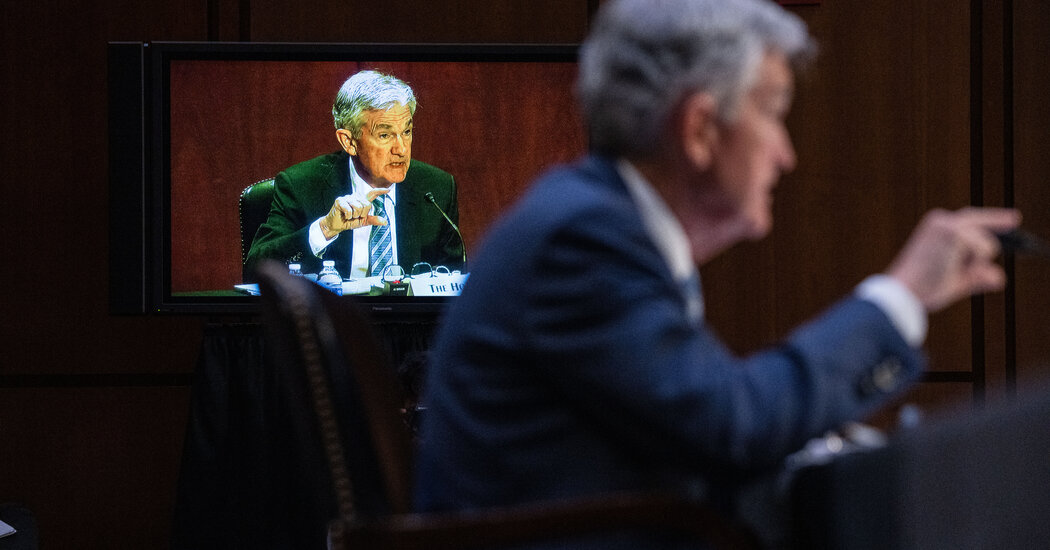Jerome H. Powell, the chairman of the Federal Reserve, said the central bank could be able to cut rapid inflation without sending America into a painful slump, though he warned it would be “very difficult” to do so. and that a recession is “definitely a possibility”.
“We’re not trying to provoke a recession, and we don’t think we will have to,” Powell said as he testified before the Senate Banking Committee on Wednesday. “But we think it’s absolutely essential that we restore price stability, really in the interest of the labor market, as much as anything.”
mr. Powell, who returns to Capitol Hill on Thursday to testify again, faces a challenging moment. Inflation, as measured by the consumer price index, is at 8.6 percent, the fastest pace in more than four decades, after rising again in May on the back of rising gas prices and airline tickets. While the economy remains strong and unemployment is at an all-time low at 3.6 percent, rapid price increases have prompted the Fed to adjust its policy at an accelerating pace to try to cool demand.
The Fed raised its key rate by three-quarters of a percentage point last week, the biggest step since 1994, after raising a quarter point in March and half a point in May. The escalation comes as central bankers become increasingly concerned about the magnitude of inflation, the prices of goods and services spanning the entire economy, and worry that consumer expectations for future price increases will begin to rise. If people expect faster inflation, they can demand higher wages to cover costs and push employers to charge more thanks to rising labor costs, creating an inflation cycle.
“We understand the full scope of the problem and we are using our tools to address it quite vigorously now,” said Mr. Powell during his testimony. “Price stability is really the foundation of the economy.”
The Fed’s policy of curbing demand and lowering inflation is expected to hurt the economy. Central bankers themselves predict that unemployment will rise and growth will slow as higher rates take effect, making mortgages, credit card debt and business loans more expensive.
“I think you’ll see continued progress, rapid progress toward higher rates,” Mr Powell said.
Wall Street investors are concerned that the central bank will trigger a recession in its attempt to lower inflation, and economists have warned that unemployment may need to rise significantly to bring demand down enough to bring inflation back under control. Households fear for the future and consumer confidence plummets. Fed officials have reiterated that they are trying to stabilize prices without triggering a recession, though they have also acknowledged it will be difficult to pull off.
Achieving that goal “has been made considerably more difficult by the events of recent months,” Mr Powell said, citing supply disruptions due to closures in China and the war in Ukraine that have pushed prices even higher.
Still, he said the central bank must do what it can to curb price increases, because the other risk is that the Fed will not restore price stability and that high inflation will anchor in the economy, leaving people with low incomes more than someone else.
“I’m trying to reduce demand growth — we don’t know demand actually has to fall, which would be a recession,” said Mr. powell. He later added, “This is very high inflation, and it hurts everyone, and we have to do our job and get inflation back on a path of 2 percent.”
The looming economic pain is causing trouble for many of the politicians Mr. Powell is testifying before this week — especially the Democrats in power. President Biden’s voter approval has sunk under the weight of inflation, which the government regularly calls its top priority.
In fact, Mr. Biden planned to appeal to Congress on Wednesday to temporarily suspend the federal gas tax in an effort to slow rising fuel prices. Implementing such a measure could be challenging, and economists have generally dismissed that policy as having limited impact, like most inflation-fighting measures the government has been able to introduce.
The Fed, which is independent of politics, is the country’s main response to soaring prices. Its policies may be painful, but they are isolated from election cycles, allowing central bankers to make tough short-term decisions to put the economy on a more stable track in the long run.
But the central bank’s policy is not quite right for the moment. Tariffs are working to slow demand, but many of the factors driving inflation today are supply-related: China’s efforts to contain the coronavirus have slowed factory production, gas and food costs have risen after Russia invaded Ukraine, and ongoing shipping problems that started during the pandemic have kept some parts and goods out of stock.
“Inflation has clearly surprised positively over the past year and more surprises could be coming,” Powell said on Wednesday.
While the White House has emphasized the Fed’s central role in fighting inflation, some Democratic senators — including Elizabeth Warren of Massachusetts — questioned whether hurting the economy was the right solution to today’s rapid price hikes. Some pushed for a more tailored approach, even as the White House’s more precise efforts are struggling to gain traction.
mr. Powell acknowledged that interest rate movements would not lower food or fuel prices, but that they affect the economy by making it more expensive to spend on borrowed money, lowering stock and other asset prices, and through global currency adjustments.
“The idea is to moderate demand so it can better balance supply,” said Mr. Powell.


